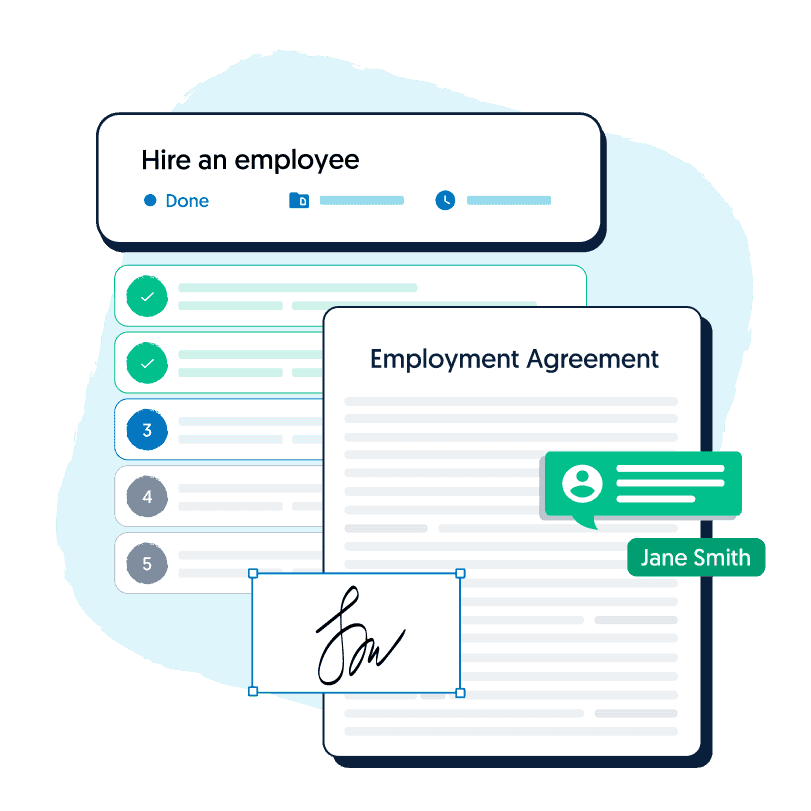Sydney-based lawyer. Formerly Legal Content Writer at Lawpath.
Are you thinking about starting your own labour hire company and unsure of where to start? Despite the challenges, labour hire companies are growing in popularity due to the many benefits they provide to employers and employees.
To help you get your labour hire company up and running we’ve created a detailed guide for you to follow. Read along to know which law governs labour hire companies, whether you need a license, and answers to other frequently asked questions.
What is a Labour Hire Business
Labour hire refers to outsourcing workers to work for a third-party host company. A labour hire business helps in recruitment and staffing of competent individuals on behalf of companies or individuals.
Labour hire businesses have contracts and agreements with multiple people who are on the job-market. They are able to staff them to different companies/individuals on an on-hire’ or ‘lease’ basis. This type of employment arrangement differs from the traditional recruitment process which typically involves long-term contracts.
Labour hire workers are skilled workers who are contracted by an employment agency and then placed at companies where their skill-sets are required. Their assignment to these companies can be a part-time or full-time commitment.
Generally, the host business will provide the labour hire company with a job description. The labour hire company will then determine whether they have an employee or employees capable of performing the requested task.
Starting an Labour Hire Business: The Pre-Steps
Before you start your Labour Hire Business certain pre-steps can set you up for success. These prerequisites can help you plan and execute your business idea in a better way:
Research
Research on your competitors can help you create a good business plan. A competitor analysis can highlight areas where there is high demand but low supply. Your business can then step in to fill this gap in supply. For instance, if software engineers are in high-demand in your area but no labour-hire company provides software-engineers, your company can focus on providing software engineers to fill this gap.

Access a free template for a Labour Hire Agreement when you sign up to Lawpath today.
Find Your Speciality
A competitor analysis can help in determining the types of labour offered by your competitors. You can establish your speciality even in a labour-hire company. For instance, you can create a business that only provides labour for creative agencies.
Fund Your Business
You can organise your spending by creating an estimate of your monthly, quarterly and annual profits. This can help you in determining if you will need to acquire additional funding, either through personal savings, loans, or investors to fund your business before your profits are able to cover your operation costs. .
Create a Business Plan
Arguably, this is the most important step when starting a business. You need to map out the specifics of your business and understand your business goals. Grab a piece of pen and paper and start answering these questions in detail:
Who is your target market and how will you reach them?
Your target market will depend largely on the products you sell. You can conduct a consumer analysis in your area to determine consumption trends. You can then advertise your products to your target audience.
What is the name of your business?
Every business in Australia needs to register for an Australian Business Number with a business name to function as a business. You will need to name your business for the same. An ABN also enables you to apply for the goods and services tax (GST) concessions.
Where will you be located?
Your nursery can be started from your backyard or from a leased store space. Depending on the size of your company, you might also need to rent office-spaces for your business.
What is your business goal? Do you have a mission statement?
A business objective or business goal can help you shape your business. A mission statement can also help consumers decide if they identify with your mission.
How much will you charge customers for each product?
Note, you must also comply with any legal requirements applicable to your type of business. Navigate your way through the Australian Securities & Investments Commission website.
How to choose the best business structure
The success of your business can also be dependent on the structure you choose for your business. Some business structures can provide risk-protection and tax-benefits whereas some might create higher tax-liability than other structures.
- Sole trader: This can be a low-cost option for an individual running the business. A sole-trader and their company are considered the same entity and hence they are responsible for the company’s debts and obligations.
- Partnership: A partnership is controlled by two or more people who also share the debts and obligations of the company.
- Company: A company has a complex structure and can legally sue and be sued. In other words, it is a legal entity in itself. Companies are incorporated under the Corporations Act 2001 (Cth) and are governed by the Australian Securities and Investments Commission (ASIC).
- Trust: A less common business structure is a Trust. A trustee can either be a company or an individual and the trustee has full control and legal responsibility for the trust and its incorporation.
You can decide your business structure based on some of the following factors:
- Ownership: If you want to co-own the company with another partner, you can register as a partnership. Here, the obligations of the company will be divided out between the partners.
- Taxation: In Australia a company has a lower tax rate than the highest tax bracket for individuals. Therefore, registering as a company can have lower tax obligations. However, companies might have higher regulatory costs.
You can read more about the different business types before deciding your business structure.

Legal Health Check for Small Business
Uncover your small business’ legal gaps in minutes with this award-winning tool.
Choosing The Right Employees
Your company will also require employees to manage clients, load, store and ship goods. Employees might also be required for book-keeping, cleaning, packaging, etc. You need to determine if you want to hire casual, part-time or full time employees for your business.
- Part-time employees: Part-time employees generally work for less than 38 hours a week. They can still receive some employment benefits, such as sick-leaves or annual leaves, on a pro-rata basis.
- Full-time employees: Full-time employees work consistently for fixed pay, subject to change on employer discretion. Generally full-time employees receive a wide variety of employment benefits such as sick leaves, health insurance, etc.
- Independent Contractors: Independent contractors are freelancers or individuals who offer their services for a fixed period of time to a company for a fixed price.
Here is a webinar on how to hire the right employees for your business.
Embed [ https://www.youtube.com/watch?v=kYV6NYJETBI&ab_channel=Lawpath]

Are you looking to hire an employee?
Use our "Hire an employee" workflow to complete and check off all your legal requirements
Marketing Your Business
Now that you’ve understood your business structure, plan and the industry, you need to wrap your head around how you will advertise your labour hire business. You can choose to market on sites such as Google as well as popular social media platforms. Instagram in particular is a growing marketing platform for businesses.
The algorithm allows for targeted advertising, distributing your business name in consideration of the age and interests of users. There’s no point wasting your money on advertisements for people who wouldn’t even give a second glance. You can also form a partnership with local companies who are willing to offshore their recruitment process.
Labour Hire Businesses and the Law
A labour hire company hires and manages a large pool of candidates who can be then staffed at different businesses based on demand. These are some of the legalities you might have to worry about as you start your own labour hire company:
- Business License: You need to register your business and receive the Australian Business Number (ABN) in order to begin operations. Lawpath can register your business for you!
- Permits: You will need to apply for a labour-hire license based on the region you operate in. For instance, Queensland requires a license to operate as a labour hire provider. Labour hire licenses are valid for 12 months and can be renewed. Labour hire permits in different parts of Australia can differ. For instance, labour hire in South Australia can differ from labour Hire in Victoria in the permits it requires. It is best to check your state website for detailed guidelines.
- Contracts: As a labour hire company, you will need to first hire labour then provide them to businesses in need. This process can require different types of employment contracts.
- Workplace health and safety (WHS) regulations: Your business must comply with WHS regulations.
- Labour Hire Agreements: A labour hire agreement is an agreement between a labour hire business and the host company that wishes to hire labor using that company. It should outline expectations and obligations of each party. It can include the process of requesting workers; insurance requirements, dispute resolution procedure and invoicing procedure.
- Workplace Policies: While the contracted labor is working for you, it can still be governed by your workplace policies. You can outline your workplace policies such as harassment policy, IT use policy, etc.
Lawpath can help you in creating your own employment contracts.

Get a free legal document when you sign up to Lawpath
Sign up for one of our legal plans or get started for free today.
FAQs
Who pays labour hire employees?
Labour hire workers receive payment from the labour hire company they’re employed by instead of the host employer they’re working for. Employee entitlements labour hire workers receive must also be managed by the labour hire company they’re employed by.
However, host employers direct the tasks that the employees must complete.
How much does a labour hire license cost?
The cost of a labour hire license differs from state to state and can depend on the type of business you plan to operate.
For example, if your labour hire company is located in Victoria, you’re required to pay an application fee of $1651.32 if your business is a tier 1 business with a maximum turnover of $2,000,000.
Contrastingly in Queensland, the tier system is based on the wages paid in the previous financial year prior to the application being made for the license. The application fee for a tier 1 business in Queensland is $1,083.43.
Other fees related to a labour hire license include annual fees and renewal application fees
What are the benefits of having a labour hire company?
Labour hire companies provide benefits to labour hire employers, labour hire employees, and host employers, benefits include the following:
- Employees are matched directly to roles that suit their previous roles, skills, and responsibilities
- Host employers save time as they don’t have to go through their own recruitment process
- Recruitment costs are reduced for host employers
- Host employers will receive assistance from skilled employees who are suitable for the task
How do labour hire companies make money?
Labour hire companies make money by charging host companies a fee for the work that their employees complete.
What entitlements and rights do labour hire workers have?
According to the FairWork Ombudsman labour hire employers must always provide their workers with minimum employment entitlements.
Pursuant to the Fair Work Act 2009(Cth), a labour hire employee’s relevant award or enterprise agreement and the National Employment Standards (NES) will apply to them irrespective of the host business’s employment arrangements.
NES minimum entitlements provided to labour hire employees override other provisions if they’re less favourable to the employee. These include the following:
- Awards
- Employment agreements
- State awards
- State agreements
- Employment contracts
The award that will apply to you and your employee will depend on the industry of your business and the type of work performed by your business.
Who is responsible for the safety of labour-hire workers?
According to SafeWork Australia host employers and labour hire companies share the responsibility for the safety of labour hire workers. Although host employers have the primary duty of care in regards to labour hire workers.
Nonetheless, you can’t rely on the host employer to take full responsibility for the health and safety of your labour hire employees or for visitors or the public whose danger may be impacted by the work site.
Labour hire firms and host employers are required to undertake a specific risk assessment of potential hazards and to ensure appropriate safety measures are put into place.
However, individuals must also show responsibility regarding their own safety and health and are obligated to look after the health and safety of others at the work site.
Do labour hire workers have workers compensation?
Labour hire employers are required to provide their employees with workers compensation.
How are labour hire workers consulted?
Labour hire workers must be consulted by their own employers and host employers. Consultation refers to discussions regarding workplace health and safety.
The decisions host employers make directly impact employees. Therefore, workers are required to contribute to work health and safety (WHS) decisions. Under SafeWork labour hire employees are considered as ‘workers’ and therefore are entitled to consultation rights.
In order for a worker’s safety to be ensured, the labour hire company, host employer, and employee must communicate effectively. Labour hire employees must be consulted about the following:
- The work they must complete
- The workplace’s safety
- Which substances, machinery, or equipment they’ll be required to use
- Whether personal protective equipment is required and who will provide it
- Work-related hazards and risks
- The precautions being implemented to guarantee their safety
- What roles the labour hire agency and host employer will have in the event of an incident
Labour hire companies are responsible for ensuring whether the host employer’s WHS consultation arrangements are suitable for their employees.
To ensure compliance with WHS laws, each duty holder in a labour hire employment relationship is required to share information to determine how work is being performed and to cooperate with one another.
Conclusion
Although a labour hire business company can be difficult to start up, if done correctly, it can be rewarding and highly successful. Using this guide, you can ensure your company is at the best starting point to succeed.If you’re still feeling unsure about how to start a labour hire company and its legal requirements you should use Lawpath to speak to a lawyer.

Get a fixed-fee quote from Australia's largest lawyer marketplace.






